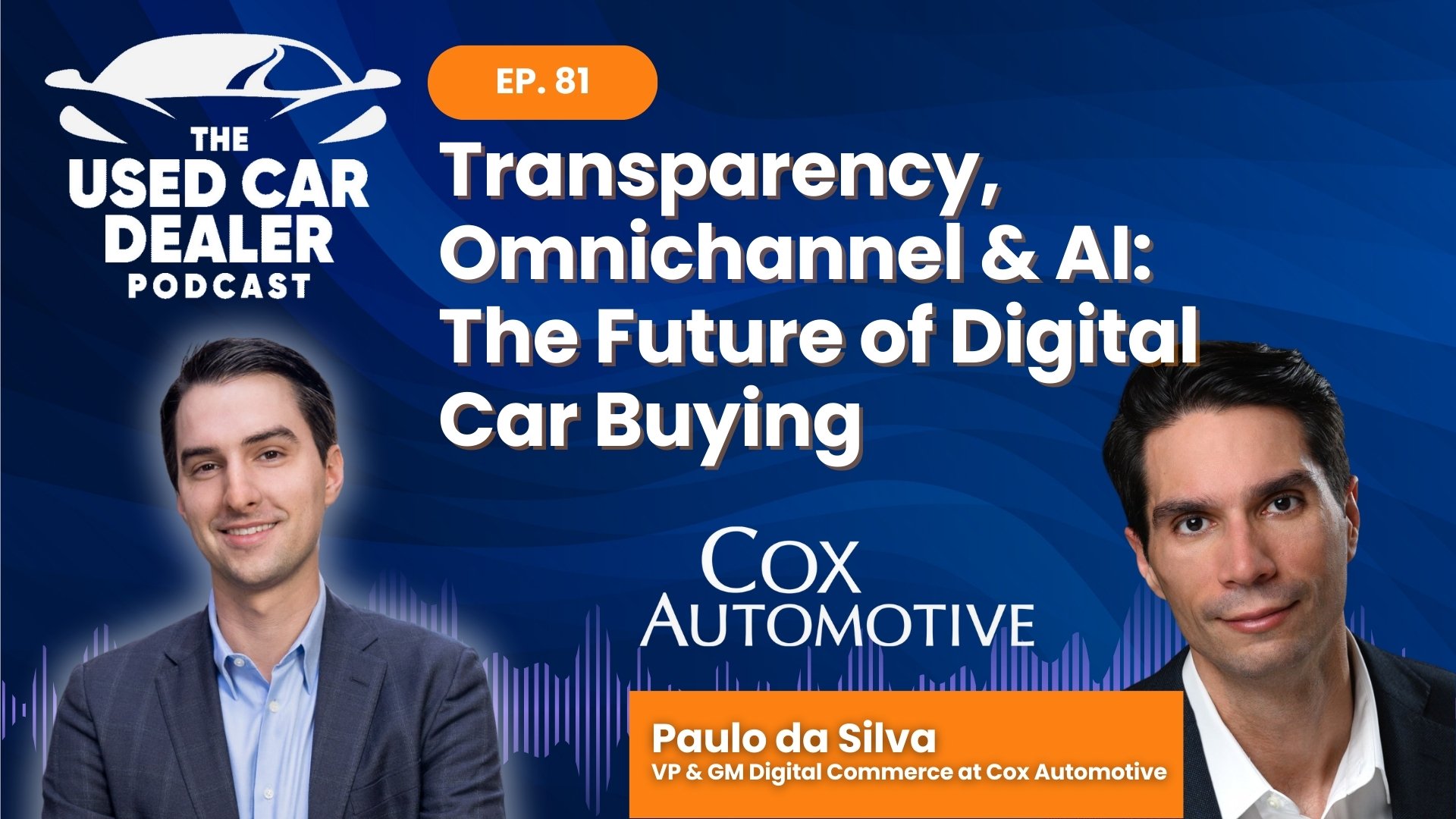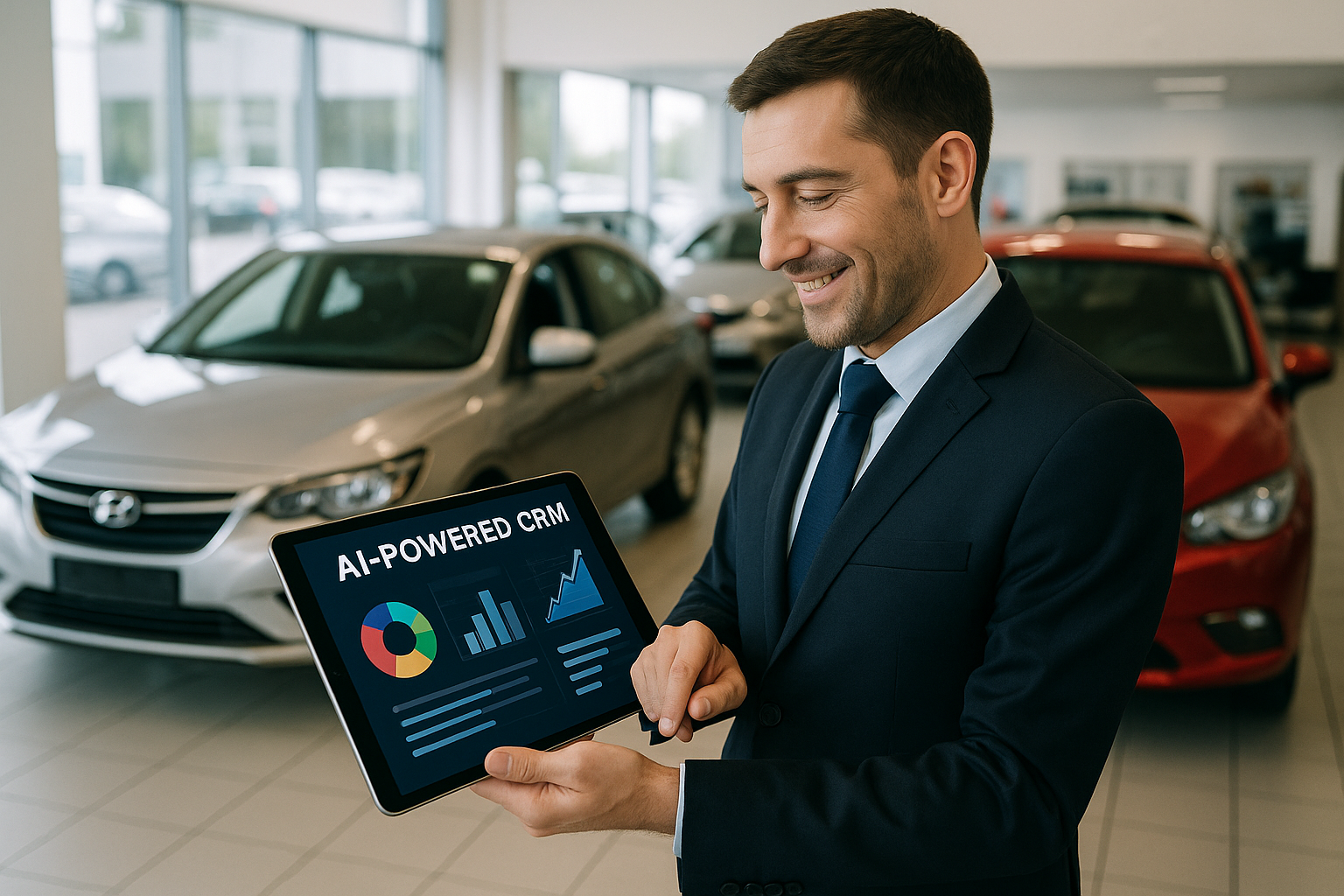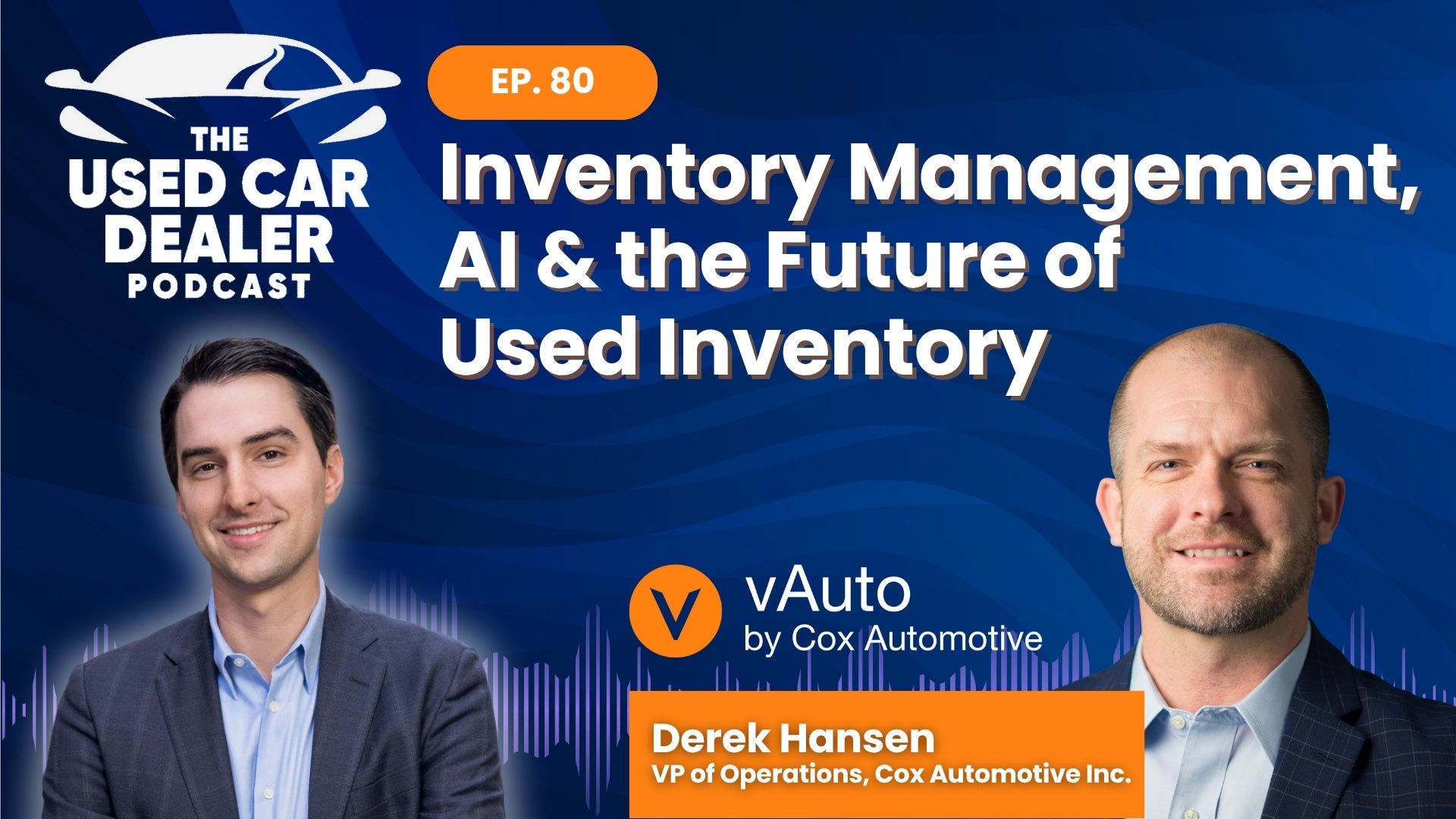In this transcribed episode of the Used Car Dealer Podcast, Zach interviews Mike Goodwin, Founder and President of EverLogic, a leading Dealer Management System (DMS) company in the RV and trailer space. He shares his 20+ years of expertise on a range of topics relevant to RV, trailer, and golf cart dealers, including industry challenges, and technological advancements.
Zach: Hello, Zach here, and today I'm excited to welcome Mike Goodwin, the founder and president of Everlogic, which is a leading DMS—that's a Dealer Management System—in the RV and trailer space.
Mike: Hey, good morning, Zach. Thanks for having me. I appreciate it.
Zach: So, Mike, you've been in the industry for over two decades, and you started in the RV business before founding Everlogic. Can you tell us more about your journey and what inspired you to create a DMS tailored for the RV and trailer market?
Mike: Yeah, so the Everlogic story started back in 2003. My family—my father-in-law—had a bunch of dealerships here in the Southeast United States, and I was working as a consultant at the time. I was building an application for a transport company that interfaced with QuickBooks. He happened to have a challenge where he was using a DMS system that didn't work with QuickBooks; it had its own accounting system. But he was taking all that information and re-entering it into QuickBooks, and I was like, "Why are you doing that?" You could just build a bridge from the application you're using, send that data directly into QuickBooks—that way you're not going to have to re-key everything. He had probably six or seven people working in his accounting department re-keying everything into QuickBooks so he could get the financials the way that he wanted them.
And so I told him, "Hey, we can build a bridge." At the time, I was just working independently, and we started to do that. Then we were away one weekend at the Tampa Super Show, which is a big RV retail show here in Florida. During the weekend, we just started talking more and more about it, and he became convinced that we needed to actually have our own DMS. Basically, he wanted to build a desking system to start with. We decided to form a company and build out the desking system, and then we eventually included parts and service and became a full DMS system. But the key was always integrating with QuickBooks and not building our own accounting system. So we rely on that for an accounting system, but Everlogic is really the operating system that does everything on the front end—from managing inventory for your parts and your units, your serialized inventory, as well as the ability to sell them, print out all your documents, as well as have a point of sale and a service system. So you bring your RV or your trailer in for repair, we have the ability to organize the work, schedule it with technicians, have technicians do the work, and then ultimately be able to invoice the customer. So that's kind of how we got started, Zach. Yeah, it's been a lot of fun for the last couple of decades. When you put it that way, it seems like I've been in this industry forever.
Zach: Super impressive though, Mike. I want to ask you, what are some of the unique challenges that RV and trailer dealers face compared to maybe other types of dealers the audience is familiar with, and how does Everlogic address these challenges?
Mike: One of the biggest things—the difference, I think, between automotive, which is what a lot of DMSs kind of cater to—is it's a really big market. The RV and trailer market is a lot smaller, and there are some unique challenges that each one of these dealers face. RV, for example, they need to be able to track a lot of add-ons to the product. When you think about most RV dealerships, they have a service component. They're sourcing a lot of parts. If you think about your house, for example—this is a house on wheels—and when you're driving down the road at 60 or 70 miles an hour, things are going to get loose and things are going to break. But there are a lot of different parts and components that go along with RVs and trailers, and you need to be able to add those costs into the unit and make sure that you're tracking those things accurately. We build tools around that to make sure that if you're adding on something into an RV or a trailer, that you're making sure we're tracking those costs and that those costs eventually are going to be billed off to the customer so that the dealership remains profitable. There's just a lot of different parts; they could be sourced from the manufacturers themselves or distributors that cater to the RV or the recreational marketplace, as well as—you know—you can pick stuff up at Home Depot or AutoZone. So you've got to be able to work with a lot of different companies, and that's kind of, I guess, the biggest difference that many RV dealers face.
Zach: Makes a lot of sense. And now you're expanding into the golf cart marketplace. What prompted this move, and how do you see the golf cart industry evolving in the coming years?
Mike: So here in Florida, we've got a pretty lucrative golf cart industry, and we know that there's a lot of this throughout the South. We've got all these neighborhoods popping up. Just like where I live, there's neighborhoods that literally are golf cart-centric. You know, it's like everybody has a golf cart, and they may have a car, but they're driving around their neighborhoods and the villages in these golf carts. So you've got—there's definitely a lot more golf cart companies out there, and they have challenges as well. They have to be able to track core charges for their batteries and tires, and we have specific laws here in the state of Florida that you have to be able to make sure you're collecting waste disposal fees on these products. We had a golf cart dealer here in Florida that started using us basically because of our QuickBooks interface. They were using QuickBooks to run their dealership, and they just found it a little bit inadequate. QuickBooks on its own is a fantastic financial operating system, but it's not a dealership operating system. And golf cart dealers—you know—they have products that have serial numbers; they have a lot of other components that go with those products. But the specific challenges that they're facing is keeping track of these cores and these waste disposal fees and making sure that their technicians are efficient and all the challenges that an automotive dealer would face that does have a service department. So we've kind of carved out a niche there; it's been very successful with them. We've had other people approach us, and we think that Everlogic is a really good fit for these specialty vehicles, and that's kind of where we fit in the grand scheme of things.
Zach: Definitely. And kind of shifting gears, in your experience, what are the biggest technological changes happening in the industry right now, and how are dealers adapting to them?
Mike: Well, you know, when I started 20 years ago, it was very difficult for systems to integrate. There were not a lot of capabilities, even though we had started out building our software to work with APIs or application programming interfaces—a way. An API is just a special way of saying, "Hey, how do systems talk to one another?" It's kind of like thinking about people—you know, sometimes we don't all speak the same language, but we all communicate, right? So you have systems that are similar—not every system is built on the same language, and it may not interact exactly like you expect, but there's certain ways to be able to create protocols or ways for these systems to talk to one another. Just in the last, I would say, half a dozen years, I've seen a lot more integrations available with partners, and it's more expected now that systems can talk to one another. There's even intermediaries that have popped up to handle systems to talk to one another, so there's these third-party products that are available. So you just see a lot more integrations—I think is kind of what I'm seeing. People expect their systems to talk to one another; they expect to be able to get it anywhere. It's not like, "Hey, I have to go to my home office and be able to work from there." Since COVID happened, I mean, everybody is able to work remotely now, and if you've recently gone to a dealership, they have all kinds of different ways of delivering vehicles to you these days. It's not just coming in and signing paperwork; they have ways to do everything pretty much remotely. So in our industry, people are expecting the same things. So there's a lot more thoughts to having tools that really work anywhere. And so as we build the next generation of applications to support dealers, we have to make sure that we keep that in mind—that not everybody is going to walk into a brick-and-mortar store to purchase an RV or a trailer or a golf cart or any other type of vehicle. This transaction may happen completely online, and so we need to be able to support that.
Zach: Very well put. And specifically, how does Everlogic's DMS differentiate itself from other systems on the market, especially in the RV and trailer space?
Mike: So our biggest differentiator—there's two, really. One is—well, besides it's an application that's been around for quite some time and it's easy to use—but our biggest things that we hear from dealers is it really works well for multi-location dealers. I mean, when we built this, we started that as part of our ground architecture. We knew that this was going to have to function for a dealership that was going to have lots all over the place and be able to manage that business. So when we first started, like I said, my father-in-law had 13 stores at the time, and they were spread across thousands and thousands of miles, and you need to be able to manage that business and do it without having to spend a tremendous amount of money with paperwork going back and forth. So we built in some tools for document management, for example, but just being able to report by location, be able to spin up a location very easily—things like that. So that's one of our key differentiators, and being able to offer a database that is in the cloud and be able to share that information pretty much anywhere as long as you have a computer or some way to access it.
The second thing is we did not—intentionally—we did not build in an accounting system into Everlogic. We decided from day one we were going to use QuickBooks. QuickBooks is used by many small to medium-sized businesses, which fits really into the RV and trailer space—a lot of independent owners that have businesses with one to 15 locations, and they're operating independently. So they're going to use—right now, a lot of them use QuickBooks today or have used QuickBooks in the past, and they're really comfortable with it. It's easier to find people in the accounting world that have used that system, and so there's not a lot of extra training that's involved. So we said, "Hey, this is a really good accounting system. It has a lot of integrations." So back to that integrations—like banking integration and integration with other third parties and other software products—they have a really good ecosystem of products that work with QuickBooks. And so that's the other key differentiator. People come to us because they are using QuickBooks but they've outgrown it or it's not doing exactly what they need to operate their business, but they can use a system like Everlogic, which talks to QuickBooks and makes it easy to do the accounting, which at the end of the day—having accurate information and accurate numbers so that you can make good business decisions—is key to being able to operate your business and to stay in business and grow it. So that's our two main differentiators.
Zach: And what do you think are the biggest challenges that dealers in your industry are facing today, and can technology help overcome them?
Mike: Well, one of the challenges that people were recently facing is finding good employees available to work in the dealership, and technology—you know—helps them overcome that. There are tools out there to help them find people, but when you do get good people, you want to give them good tools and good systems to be able to operate at their peak performance. So definitely you want to have good systems; you don't want to be wasteful. You want to be very efficient, especially when the talent pool has maybe shrunk. We know that it did certainly a couple of years ago; maybe things have shifted somewhat, but it's hard to find people that fit your business, and once you do, you definitely want to make sure that you take care of them and give them the tools and the ability to do their jobs because that just creates more satisfaction, obviously, and then retention. So that's one of the big challenges.
The other challenge we've seen recently is in the supply chain. It's kind of started to correct itself somewhat, but for a while there, especially in the RV industry, it was very difficult to be able to get a product—and I'm talking all the way from the unit down to the parts and the replacement parts for those toys. People would be waiting months for something to come in so they could get their RV back on the road so they could be using it and stuff like that. So that's been a really big challenge, but systems help solve those problems. Being able to get proper reporting and knowing where things are in the supply chain is critical. So I think that's been a couple of the biggest challenges that have come out since COVID. I think dealers have learned a lot, and I think that overall, those kind of challenges hopefully are in our rearview mirror, and it seems like we're poised—you know—this industry is poised to grow into the future.
Zach: And you kind of touched on this a little earlier with remote delivery and storing up documents, but how have customer expectations kind of changed in your industry, and how does Everlogic help dealers meet these new customer expectation demands?
Mike: I don't know if expectations have changed. I know in general, I think people have come to expect more immediate solutions. They don't like to wait, and I think in our society, in general, we've been able to deliver, and so those expectations kind of feed upon themselves, right? A lot of it has to go back to having systems in place that allow them to respond quicker, and so our customers expect the same thing. They expect us to be able to deliver new features faster, and that's always been a challenge—you know—being able to do that. But with the tool sets that we're using, it is easier to build new features and deliver them to customers faster than we've ever been before. We're able to develop new applications and deliver them, whereas before, it might take months and months to do that. Now, we seem to be able to do it faster than we could. It still takes time, and there's still a lot of demands, a lot of different requests, but we try to meet the challenge every day.
Zach: Can you share a success story where Everlogic significantly improved operations for one of your dealerships?
Mike: Yeah. Not going to give any specific name because I didn't ask them for this podcast, but a dealership that we've really helped a lot—you know—they've grown from a single point to now over five locations. When they first started, they didn't really have inventory management in place, and they did some different things with the accounting that weren't helpful. So we've kind of been able to help them learn some of the better ways for dealers to improve their systems and their accounting, and we're able to help them grow. You know, I talk to this dealer quite frequently—we've become friends—and just a really big success story. But we've seen that with a lot of customers that we have. This guy just happened to grow pretty quickly after getting on board with Everlogic, and it's been good for us because he's got other dealers involved with our company, and we've got a lot of referrals from this gentleman.
Zach: That's awesome and speaks a lot about your product. So given the current industry trends, what do you foresee as the biggest opportunities and challenges for dealers in your space over the next few years?
Mike: I think the challenges, honestly, are going to remain the same. You know, it's going to be managing cash flow. In our industry, it seems like there's big booms followed by a pretty significant bust of the bubble. So it's kind of being able to operate through those things. Fortunately, we've just kind of finished that cycle, so I think dealers—the challenge now is just being able to get ramped up for this new buying cycle that we'll likely experience here in the next ten years, being able to meet those challenges but at the same time don't get too far ahead of yourself because we do see what can happen when you get a little bit ahead of yourself. So anyway, same business challenges don't really change across decades; they're always the same, they're fairly cyclical. We just get new things introduced to us that we have to adapt. Like, I kind of remember when social media first came on board, and that was not when I started Everlogic, and now it's—you know—that's a main driver of a lot of business. So right now, the next thing is AI—how do you adapt and use that inside of your platforms, and figuring that out. But that's going to be a big shift, and so I think it's so early right now. It'll be exciting to see kind of how it's employed inside of—employed by dealers and by companies like ours that provide systems to help run their businesses.
Zach: And lastly, really enjoyed this podcast and listening and learning a lot about the RV and trailer space. But any exciting updates or announcements as we look into 2025 from your side or Everlogic's side?
Mike: Yeah. So we recently were acquired by the AutoManager group, which is part of a bigger portfolio with the Beekman folks. So definitely there's going to be some good changes. One of the things I'm really excited about is some of the other portfolio companies that are working with AutoManager—working, I guess, under the AutoManager brand umbrella—but companies like Selly, which is what you run, Zach, and the WebManager product. I'm really looking forward to being able to bring these products into the Everlogic system, be able to operate and work with them, because our dealers have often asked for, "Hey, we need better CRM tools," and that's something that you provide. You know, we send a lot of inventory feeds out to other website companies, but it's good that we have one within our own ecosystem that we can integrate with and we can build tighter integrations because we work together every day. And so that was one of the main drivers of selling to the AutoManager group, was because of the tool sets and the other companies that we could possibly offer a more complete package to our dealers. So I'm really excited about that opportunity and what we're planning for 2025.
Zach: Yeah, I couldn't agree more, Mike. And it's just really great having you on the podcast today. Thanks for joining us.
Mike: Hey, thanks a lot, Zach.



.png)




.jpg)
.jpg)
.jpg)
.jpg)

.png)
.png)
